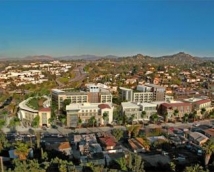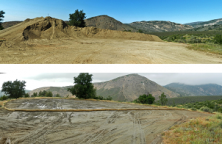
By Miriam Raftery, Editor
December 24, 2015 (San Diego's East County) --It’s been a tumultuous year around the world and also here in San Diego’s East County.
These ranged from water woes to lawsuits over education and transportation. East County residents rallied for refugees and protested land use projects ranging from a sand mine to a shooting range, as well as a casino, solar farms, a hotel highrise, and safety concerns after a plane crash near Gillespie Field. Our coverage helped clean up illegal dumping in Cleveland National Forest and save free speech outside Supervisors' meeting place. Other hot stories touched on fire safety, terrorism, police scandals, and winery regulations, There was also some good news--Lake Jennings was spared, a new habitat for bears opened, local police stepped up efforts to protect pedestrians, and Supervisor Dianne Jacob led efforts to find a cure for Alzheimer's.
Here are the stories and issues that captured the attention of our East County readers in 2015:
 Water woes: We started the year in the worst drought on record, which led to mandatory cuts in water use ordered by the state. In the Helix Water District, a hefty multi-year rate hike drew protests from 500 people. Meanwhile Pine Valley Mutual Water District shareholders fought back against water sales to an industrial solar developer, seeking to protect their precious water resources. Residents in Jacumba and Julian raised concerns over a proposed solar farm and a housing development that some fear could deplete groundwater—a valid fear given that wells have run dry in several rural communities locally. Then in July, Hurricane Dolores walloped our region, with Ramona hardest hit. At year’s end, El Niño is forecast to bring heavy rains and potential flooding—but also hope for relief from the drought.
Water woes: We started the year in the worst drought on record, which led to mandatory cuts in water use ordered by the state. In the Helix Water District, a hefty multi-year rate hike drew protests from 500 people. Meanwhile Pine Valley Mutual Water District shareholders fought back against water sales to an industrial solar developer, seeking to protect their precious water resources. Residents in Jacumba and Julian raised concerns over a proposed solar farm and a housing development that some fear could deplete groundwater—a valid fear given that wells have run dry in several rural communities locally. Then in July, Hurricane Dolores walloped our region, with Ramona hardest hit. At year’s end, El Niño is forecast to bring heavy rains and potential flooding—but also hope for relief from the drought.
 Ambulance aid: The County terminated its contract with a long-time ambulance provider and shifted coverage in rural areas Mercy Medical Transportation without public notice, as ECM reported. Mercy has met expectations for response times over 95% of the time in recent months, albeit with a couple of glitches. The real question is whether that 30-minute-response time requirement is too long. Some San Miguel Fire Board members have been pushing for shorter limits at least in more urban areas such as Spring Valley, Rancho San Diego and Crest. Should saving lives be a bigger priority for supervisors than pinching pennies?
Ambulance aid: The County terminated its contract with a long-time ambulance provider and shifted coverage in rural areas Mercy Medical Transportation without public notice, as ECM reported. Mercy has met expectations for response times over 95% of the time in recent months, albeit with a couple of glitches. The real question is whether that 30-minute-response time requirement is too long. Some San Miguel Fire Board members have been pushing for shorter limits at least in more urban areas such as Spring Valley, Rancho San Diego and Crest. Should saving lives be a bigger priority for supervisors than pinching pennies?
 Terror tie: The massacre at the Charlie Hebdo magazine in Paris in January shocked the world—and it had an East County connection. Online publications by Anwar Al Awlaki, former imam at a mosque in La Mesa, reportedly inspired the Hebdo terror attack even after Awlaki was killed by a U.S. drone in Yemen, as we reported. Awlaki, whose religious services in the San Diego area were attended by two 911 hijackers, has also been blamed for masterminding the 911 attacks. His chilling legacy continues: at year’s end, a federal indictment ties Awlaki’s teachings to radicalization of the Islamic couple that dropped their baby off with a grandparent before opening fire in San Bernardino, killing 14 people. The Hebdo massacre meanwhile inspired a hate crime locally; a La Mesa man pled guilty to threatening the Council on Islamic Relations.
Terror tie: The massacre at the Charlie Hebdo magazine in Paris in January shocked the world—and it had an East County connection. Online publications by Anwar Al Awlaki, former imam at a mosque in La Mesa, reportedly inspired the Hebdo terror attack even after Awlaki was killed by a U.S. drone in Yemen, as we reported. Awlaki, whose religious services in the San Diego area were attended by two 911 hijackers, has also been blamed for masterminding the 911 attacks. His chilling legacy continues: at year’s end, a federal indictment ties Awlaki’s teachings to radicalization of the Islamic couple that dropped their baby off with a grandparent before opening fire in San Bernardino, killing 14 people. The Hebdo massacre meanwhile inspired a hate crime locally; a La Mesa man pled guilty to threatening the Council on Islamic Relations.
 Refugee rallies: Hundreds of local Chaldeans held rallies in El Cajon and at an immigration detention facility in Otay, calling for safe haven here for Christians being slaughtered or persecuted by the Islamic Statein Iraq and Syria, and for freedom for Iraqi asylum-seekers placed in detention here. But despite personal pleas made to the President, Secretary of State and others by local Iraqis, the federal government has failed to heed their pleas. Only a handful of refugees granted entry from the Middle East since the rise of ISIS have been Christians and many have been denied entry. The President has sought to raise the cap on Syrian refugees amid a massive humanitarian crisis, but there’s no guarantee how many would be Chaldeans –and now in the wake of new ISIS threats, many governors and members of Congress are striving to block entry to Middle Eastern refugees, putting security concerns above humanitarian aide.
Refugee rallies: Hundreds of local Chaldeans held rallies in El Cajon and at an immigration detention facility in Otay, calling for safe haven here for Christians being slaughtered or persecuted by the Islamic Statein Iraq and Syria, and for freedom for Iraqi asylum-seekers placed in detention here. But despite personal pleas made to the President, Secretary of State and others by local Iraqis, the federal government has failed to heed their pleas. Only a handful of refugees granted entry from the Middle East since the rise of ISIS have been Christians and many have been denied entry. The President has sought to raise the cap on Syrian refugees amid a massive humanitarian crisis, but there’s no guarantee how many would be Chaldeans –and now in the wake of new ISIS threats, many governors and members of Congress are striving to block entry to Middle Eastern refugees, putting security concerns above humanitarian aide.
Pedestrian safety: A public records request by East County Magazine revealed a high number of pedestrian fatalities and serious injuries, as we reported in March. El Cajon Police responded to the growing problem by holding a public safety forum in November and creating a pedestrian safety video in English and Arabic, as we reported, to educate both long-time residents and the many immigrants and refugees who now call El Cajon home.
 Sex and the city: An El Cajon Police officer was demoted, but not fired, following sexual harassment claims including allegations of texting nude photos of himself to women on the force. . A lawsuit has been filed against the city over the most recent harassment claims. An ECM investigation found a string of other sexual harassment and sexual misconduct cases involving the ECPD dating back two decades. We interviewed former officers, employees and a past victim, also checking old news stories and court records for our piece. The story led to citizens rallying for reforms and testifying before the City Council. But the Council held firm, insisting the City Manager’s decision not to fire the officer was appropriate. The police chief retired later in the year though its not yet known if the new chief will implement any reforms to better protect women working for the department
Sex and the city: An El Cajon Police officer was demoted, but not fired, following sexual harassment claims including allegations of texting nude photos of himself to women on the force. . A lawsuit has been filed against the city over the most recent harassment claims. An ECM investigation found a string of other sexual harassment and sexual misconduct cases involving the ECPD dating back two decades. We interviewed former officers, employees and a past victim, also checking old news stories and court records for our piece. The story led to citizens rallying for reforms and testifying before the City Council. But the Council held firm, insisting the City Manager’s decision not to fire the officer was appropriate. The police chief retired later in the year though its not yet known if the new chief will implement any reforms to better protect women working for the department
 Solar shocker: After battling to build four controversial industrial projects in Boulevard, Soitec Solar announced it was pulling out of the solar business. Two were approved by the County, but Soitec withdrew plans for one of those. Nonprofits representing residents and environmental concerns battled the fourth project, Rugged Solar, in court, resulting in Supervisors approving the project with removal of massive battery storage facilities added after an environmental review was completed for the fourth project, Rugged Solar at the gateway to McCain Valley, a federal recreation area. Meanwhile activists continue to wage a legal battle hoping to halt Tule Wind, another major energy project slated for construction in McCain Valley. Another major solar project proposed in Jacumba is also facing community opposition.
Solar shocker: After battling to build four controversial industrial projects in Boulevard, Soitec Solar announced it was pulling out of the solar business. Two were approved by the County, but Soitec withdrew plans for one of those. Nonprofits representing residents and environmental concerns battled the fourth project, Rugged Solar, in court, resulting in Supervisors approving the project with removal of massive battery storage facilities added after an environmental review was completed for the fourth project, Rugged Solar at the gateway to McCain Valley, a federal recreation area. Meanwhile activists continue to wage a legal battle hoping to halt Tule Wind, another major energy project slated for construction in McCain Valley. Another major solar project proposed in Jacumba is also facing community opposition.
Grossmont’s war on charter schools: Grossmont Union High School District filed a lawsuit seeking to shut down certain charter schools it claims are violating the law by operating in its boundaries without the district’s permission, as ECM reported. A large crowd of students and educators turned out to protest the action, saying the charters are serving needs of students not met by the district, including refugees and minorities, pregnant students, drop-outs and kids who are too old to get a diploma in the public school system. An attorney for one of the schools, Diego Valley Charter fired back; its attorney served the district with notice claiming it is violating the California Voting Rights Act – a law intended to protect the interests of minorities.
 Efforts to block Covert Canyon shot down: The County’s new planning director drew the controversial conclusion that the Covert Canyon firearms training for military and law enforcement 12 hours a day, 5 days a week does not have a major impact on the environment or communities, and thus does not need a major permit. Environmentalists filed an appeal, which the planning commission majority shot down. A Cleveland National Forest Foundation spokesman says the decision to open up military training on land surrounded by protected federal forest means “death of a national forest”, but the owner, Marc Halcon, during a tour of the facility said such training is needed with terrorism on the rise and insists that wildlife habitat can coexist with large-caliber weapons firing. At year’s end, opponents are asking Supervisors to intervene and have threatened litigation if action is not taken.
Efforts to block Covert Canyon shot down: The County’s new planning director drew the controversial conclusion that the Covert Canyon firearms training for military and law enforcement 12 hours a day, 5 days a week does not have a major impact on the environment or communities, and thus does not need a major permit. Environmentalists filed an appeal, which the planning commission majority shot down. A Cleveland National Forest Foundation spokesman says the decision to open up military training on land surrounded by protected federal forest means “death of a national forest”, but the owner, Marc Halcon, during a tour of the facility said such training is needed with terrorism on the rise and insists that wildlife habitat can coexist with large-caliber weapons firing. At year’s end, opponents are asking Supervisors to intervene and have threatened litigation if action is not taken.
 Lakeside Sand Mine: A sand mining project with the Orwellian doublespeak name “El Monte Nature Preserve” would dredge the valley floor 30 feet deep and dump 250 trucks a day hauling sand from the scenic valley for the next 30 years, with a promise to restore habitat three decades from now. The project proponents say sand is needed for highway construction. But residents say the quality of their lives should matter more than profits. At a heated hearing of the Lakeside Community Planning Group, They raise concerns about dust, air quality, deadly Valley Fever spores, noise, and pollution of well water.
Lakeside Sand Mine: A sand mining project with the Orwellian doublespeak name “El Monte Nature Preserve” would dredge the valley floor 30 feet deep and dump 250 trucks a day hauling sand from the scenic valley for the next 30 years, with a promise to restore habitat three decades from now. The project proponents say sand is needed for highway construction. But residents say the quality of their lives should matter more than profits. At a heated hearing of the Lakeside Community Planning Group, They raise concerns about dust, air quality, deadly Valley Fever spores, noise, and pollution of well water.
 Hot hotel plans: In La Mesa, the developer of the Park Station high-rise project withdrew the application after substantial community opposition and withdrawal by a co-applicant, the American Legion, as well as rejection by the Planning Commission. Various versions ranged from 9 to 18 stories including a hotel, retail and residential units. The developer sought a waiver to a four-story height limit, which opponents contended was inappropriate within view of La Mesa’s historic downtown village. But in a tale of two cities, neighboring El Cajon’s City Council approved construction of a Marriott Courtyard hotel in its downtown district, a move that generated substantial support of downtown merchants and other residents. The Marriott is slated to open in 2016.
Hot hotel plans: In La Mesa, the developer of the Park Station high-rise project withdrew the application after substantial community opposition and withdrawal by a co-applicant, the American Legion, as well as rejection by the Planning Commission. Various versions ranged from 9 to 18 stories including a hotel, retail and residential units. The developer sought a waiver to a four-story height limit, which opponents contended was inappropriate within view of La Mesa’s historic downtown village. But in a tale of two cities, neighboring El Cajon’s City Council approved construction of a Marriott Courtyard hotel in its downtown district, a move that generated substantial support of downtown merchants and other residents. The Marriott is slated to open in 2016.
 Jamul Casino construction: At the Jamul Indian Village, construction of a Hollywood-themed casino is nearing completion. To the tribe, the casino represents a means of economic prosperity and self-sufficiency for tribal members. (Hear our interview with tribal chair Erica Pinto) But to a vocal group of neighbors protesting construction, the project raises traffic and fire safety concerns along Highway 94, the primary escape route during wildfires. The casino is slated to open next year and has thus far survived court challenges, though appeals continue to work their way through the courts.
Jamul Casino construction: At the Jamul Indian Village, construction of a Hollywood-themed casino is nearing completion. To the tribe, the casino represents a means of economic prosperity and self-sufficiency for tribal members. (Hear our interview with tribal chair Erica Pinto) But to a vocal group of neighbors protesting construction, the project raises traffic and fire safety concerns along Highway 94, the primary escape route during wildfires. The casino is slated to open next year and has thus far survived court challenges, though appeals continue to work their way through the courts.
 Alpine High legal wrangling: Despite a grand jury recommendation to build an Alpine High School promised in two bond measures, the Grossmont Union High School District refused to do so. The County Board of Education sided with parents, recommending in late 2014 that Alpine families be allowed to leave the Grossmont District and take bond funds to have the Alpine Union School District expand to include high school age students and build the new high school. Grossmont refused to turn over the money, so Alpine taxpayers and the Alpine Union school district sued in 2015. The case has had more twists and turns than a roller coaster ride, with the latest court hearing December 17 and a decision pending at year’s end. Despite betraying Alpine voters’ trust twice, the district has hired a consultant to study feasibility of asking voters to support yet another school bond, an action called “fiscally irresponsible” by an ex-bond oversight committee member.
Alpine High legal wrangling: Despite a grand jury recommendation to build an Alpine High School promised in two bond measures, the Grossmont Union High School District refused to do so. The County Board of Education sided with parents, recommending in late 2014 that Alpine families be allowed to leave the Grossmont District and take bond funds to have the Alpine Union School District expand to include high school age students and build the new high school. Grossmont refused to turn over the money, so Alpine taxpayers and the Alpine Union school district sued in 2015. The case has had more twists and turns than a roller coaster ride, with the latest court hearing December 17 and a decision pending at year’s end. Despite betraying Alpine voters’ trust twice, the district has hired a consultant to study feasibility of asking voters to support yet another school bond, an action called “fiscally irresponsible” by an ex-bond oversight committee member.
Gillespie crash: A plane crashed into a Santee home in September, killing the pilot and a student from a flight school at Gillespie Field in El Cajon. The tragedy heightened concerns already raised by many Gillespie neighbors over increased training flights over homes, but their complaints to the county remain unresolved as residents organize in hopes of ultimately filing suit.
 Toxic elementary: Days after parents filed a lawsuit against a company accused of dumping toxic wastes for years next to Magnolia Elementary School, the Cajon Valley District voted to shut down the school for a full year. According to the suit, 7,000 gallons of trichloroethylene (TCE) chlorinated solvent waste dumped by Ametek has created an underground plume over a mile long, extending to Gillespie Field—the largest such plume of TCE in California.
Toxic elementary: Days after parents filed a lawsuit against a company accused of dumping toxic wastes for years next to Magnolia Elementary School, the Cajon Valley District voted to shut down the school for a full year. According to the suit, 7,000 gallons of trichloroethylene (TCE) chlorinated solvent waste dumped by Ametek has created an underground plume over a mile long, extending to Gillespie Field—the largest such plume of TCE in California.
 Bear necessities: Thanks to help from generous donors, a permanent and spacious sanctuary for rescued bears opened at Lions, Tigers and Bears in Alpine. Since taking in its first bear, Meatball, in 2012, and opening its bear habitat last December, the facility has accepted many more; at year’s end in 2015 the facility now houses 10 bears ranging from grizzly and black bears to exotic species such as Himalayan bears.
Bear necessities: Thanks to help from generous donors, a permanent and spacious sanctuary for rescued bears opened at Lions, Tigers and Bears in Alpine. Since taking in its first bear, Meatball, in 2012, and opening its bear habitat last December, the facility has accepted many more; at year’s end in 2015 the facility now houses 10 bears ranging from grizzly and black bears to exotic species such as Himalayan bears.
 Transportation troubles: The San Diego Association of Governments (SANDAG) approved a regional sustainability plan in December – despite a lawsuit won by environmentalists that is now on appeal to the state Supreme Court. Critics contend the plan’s transportation component puts freeways first and makes mass transit a low priority—the opposite of what the state’s climate change mandate requires.
Transportation troubles: The San Diego Association of Governments (SANDAG) approved a regional sustainability plan in December – despite a lawsuit won by environmentalists that is now on appeal to the state Supreme Court. Critics contend the plan’s transportation component puts freeways first and makes mass transit a low priority—the opposite of what the state’s climate change mandate requires.
 Air tanker Battle: When the Forest Service refused to land its jumbo air tankers at the Ramona Air Base, Cal-Fire released a video proving it possible to land an identical plane there. But despite pleas from County Supervisors, the entire local Congressional delegation, and Cal-Fire/County Fire Chief Tony Meacham, the Forest Service has thus far failed to lift the ban, putting East County residents at risk if tankers must come from outside our county to fight a major wildfire.
Air tanker Battle: When the Forest Service refused to land its jumbo air tankers at the Ramona Air Base, Cal-Fire released a video proving it possible to land an identical plane there. But despite pleas from County Supervisors, the entire local Congressional delegation, and Cal-Fire/County Fire Chief Tony Meacham, the Forest Service has thus far failed to lift the ban, putting East County residents at risk if tankers must come from outside our county to fight a major wildfire.
 Measles outbreak: Measles exposure that started at Disneyland led to an outbreak in East County and elsewhere in California. The scare prompted legislation signed by the Governor that mandates vaccinations for public school children statewide, with exemptions allowed only for medical reasons, not parental choice.
Measles outbreak: Measles exposure that started at Disneyland led to an outbreak in East County and elsewhere in California. The scare prompted legislation signed by the Governor that mandates vaccinations for public school children statewide, with exemptions allowed only for medical reasons, not parental choice.
 Mosquito buzz: As if fatal cases of West Nile Virus borne by mosquitoes in East County, including death of an El Cajon man this year, aren’t enough to send you reaching for the bug spray, now the Aedes Aegypti mosquito has been found in several locations countywide. It carries Yellow Fever and Dengue Fever, plus at year’s end Brazilian health officials warn that the bite of this mosquito—which breeds indoors—may be linked to serious birth defects in children.
Mosquito buzz: As if fatal cases of West Nile Virus borne by mosquitoes in East County, including death of an El Cajon man this year, aren’t enough to send you reaching for the bug spray, now the Aedes Aegypti mosquito has been found in several locations countywide. It carries Yellow Fever and Dengue Fever, plus at year’s end Brazilian health officials warn that the bite of this mosquito—which breeds indoors—may be linked to serious birth defects in children.
 Lake Jennings reprieve: In a year of largely disturbing news, it’s nice to have some good news to share. Last year the Helix Water District was on the verge of shutting down Lake Jennings campgrounds and other recreational activities to the public. But thanks to efforts led by Director Joel Scalzetti, a deficit has been sharply reduced and the board voted not to shut down public access to the popular facility—for now. But the issue will be up for consideration again next June.
Lake Jennings reprieve: In a year of largely disturbing news, it’s nice to have some good news to share. Last year the Helix Water District was on the verge of shutting down Lake Jennings campgrounds and other recreational activities to the public. But thanks to efforts led by Director Joel Scalzetti, a deficit has been sharply reduced and the board voted not to shut down public access to the popular facility—for now. But the issue will be up for consideration again next June.
 Winery regulations: This year, County staff is revisiting the tiered winery ordinance that has given root to dramatic growth in our local wine-making industry. At a heated hearing, some said the ordinance is too strict on allowing smaller wineries to serve up food and music along with wine-tasting, but others said the restrictions don’t go far enough. Will the changes spur new growth or cause some local wineries and vineyards to die on the vine? Only time will tell, so stay tuned for the final revisions due out in 2016.
Winery regulations: This year, County staff is revisiting the tiered winery ordinance that has given root to dramatic growth in our local wine-making industry. At a heated hearing, some said the ordinance is too strict on allowing smaller wineries to serve up food and music along with wine-tasting, but others said the restrictions don’t go far enough. Will the changes spur new growth or cause some local wineries and vineyards to die on the vine? Only time will tell, so stay tuned for the final revisions due out in 2016.
 ECM investigation cleans up illegal dumping: Complaints from environmentalists to the County had fallen on deaf ears regarding illegal dumping of 20,000 cubic yards of dirt in Cleveland National Forest at the headwaters of Boulder Creek, which feeds our region’s most scenic waterfalls. But after we received a video and photos documenting the mess, we contacted Supervisor Dianne Jacob. Within 24 hours the piles were covered and days later, a major clean-up was ordered. Cindy Buxton, who sent us the video, thanked us for our efforts, adding, “You must be magical!”
ECM investigation cleans up illegal dumping: Complaints from environmentalists to the County had fallen on deaf ears regarding illegal dumping of 20,000 cubic yards of dirt in Cleveland National Forest at the headwaters of Boulder Creek, which feeds our region’s most scenic waterfalls. But after we received a video and photos documenting the mess, we contacted Supervisor Dianne Jacob. Within 24 hours the piles were covered and days later, a major clean-up was ordered. Cindy Buxton, who sent us the video, thanked us for our efforts, adding, “You must be magical!”
 Saving free speech: In June, we reported on a county proposal to restrict ban free speech outside the County Administration Building,(where East County residents have previously held rallies on issues ranging from immigration to wind energy projects. The American Civil Liberties Union sent the County a letter advising that its proposal appeared unconstitutional and citizens testified against forcing protesters into “free speech zones” away from view of Supervisors entering the building. In the end, Supervisors tabled the ill-conceived plan, granting victory to First Amendment and free speech advocates.
Saving free speech: In June, we reported on a county proposal to restrict ban free speech outside the County Administration Building,(where East County residents have previously held rallies on issues ranging from immigration to wind energy projects. The American Civil Liberties Union sent the County a letter advising that its proposal appeared unconstitutional and citizens testified against forcing protesters into “free speech zones” away from view of Supervisors entering the building. In the end, Supervisors tabled the ill-conceived plan, granting victory to First Amendment and free speech advocates.
 Alzheimer's Project: Supervisors approved the Alzheimer's Project, a measure brought forward by East County's Supervisor Dianne Jacob to make San Diego County the center of medical research efforts to find a cure for Alzheimer's, also helping to improve the lives of 60,000 Alzheimer's patients and caregivers in our region. Hear our interview with Supervisor Jacob on her efforts here. The National Association of Counties also presented San Diego with an achivement award in recognition of its efforts battling Alzheimer's.
Alzheimer's Project: Supervisors approved the Alzheimer's Project, a measure brought forward by East County's Supervisor Dianne Jacob to make San Diego County the center of medical research efforts to find a cure for Alzheimer's, also helping to improve the lives of 60,000 Alzheimer's patients and caregivers in our region. Hear our interview with Supervisor Jacob on her efforts here. The National Association of Counties also presented San Diego with an achivement award in recognition of its efforts battling Alzheimer's.








Comments
Thanks and watch for our "newsmakers of the year" soon, too.
These do take a lot of effort to research and prepare each year!
an excellent journalistic summary....